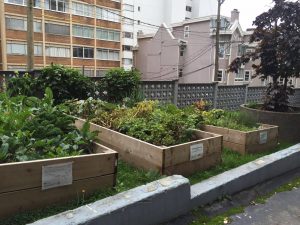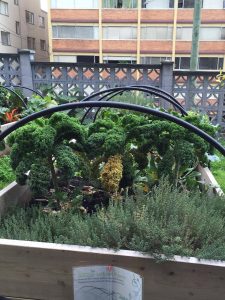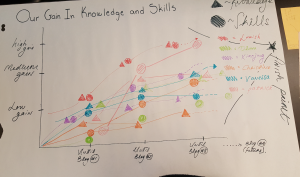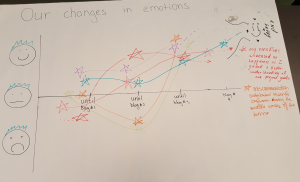“We do not learn from experience, we learn from reflecting on experience.” -John Dewey (American philosopher)
Reflecting is the process of examining and interpreting past experiences to gain new understanding (Pennacchia, n.d.). In the educational context, the act of reflection plays a critical role in group-based learning by challenging students to connect their activities to the course objectives and develop higher-level thinking and problem solving (Wismath et al., 2014). More importantly, the reflection process allows students to develop a more deep understanding of their group members’ current values, goals and emotions which ultimately, enables them to work better cooperatively (Reed & Koliba, 1995).This week, our group was assigned the task of reflecting upon a “Moment of Significance” during tutorial in an effort to check-in and revise goals and expectations. If you are interested in learning more about the outcomes of this activity and our new expectations for this project, we invite you to continue reading our blog. We believe that our description of the in-tutorial reflection project will provide valuable insight into the benefits of self-reflection and evaluation, which may improve your current and future group endeavors.
Weekly Objectives, Achievements & Strategies
Week 8
Oct. 23th – 29th
- To arrange a meeting time with the Gordon Neighborhood House
- To assist the Head Farmer with the weekly farm maintenance activities
- To redistribute project responsibilities to every member
- To discuss the design of the crop plan
Achievement:
Throughout the term, each member dealt with a busy schedule, making it extremely challenging to set up a time for the whole team to meet with the Head Farmer; however, during the flexible learning session on Oct 26th, we were able to meet at GNH as a team and finish a number of assigned gardening tasks on the rooftop farm. Through frequent group communication, we were able to equally distribute the project’s tasks for the next month. After conducting literature reviews on similar crop types, our group developed a few ideas for our crop plan and discussed the infographics design. While doing so, we did our best to incorporate each member’s ideas and consider our community partner’s needs and wants.
Week 9
Oct. 30th – Nov. 5th
- To schedule the next meeting with Gordon Neighborhood House
- To complete the “Moment of Significant Change” assignment in tutorial session
Achievement:
During the tutorial session on Nov. 2nd, each member had the chance to contemplate and identify his/her significant changes in knowledge, skill, and emotion thus far. Subsequently, we were given a time to share our growths and feelings with our group members and classmates. Lastly, we were assigned the task to create two line graphs. One of them illustrated our gains in conceptual knowledge and farming skills, while the other one depicted our changes in emotion as the project progressed. All the members had a significant gain in knowledge and silks, and felt positively about the project, especially after finishing Blog #2.
By taking a moment to reflect on our current gains in knowledge and skill, our group left the tutorial session feeling motivated and inspired to work-harder for the success of our project. Despite this, we did not arrange a meeting time with our community partner for this week. Weare planning to discuss each group member’s availability during the weekend in hopes of scheduling a time to meet with GNH

Nicosia Place: Raised carrot, potato and kale beds
Upcoming objectives
Weeks 10 + 11
Nov. 6th – 19th
- To visit all the GNH urban farms to conduct more detailed observations
- To summarize the information gained from the observations
- To arrange an interview date with the program coordinator for further information
- To build the initial draft for the crop plan (infographic) and project report
- To improve our designed crop plan by requesting feedback from the Head Farmer
- To begin preparing for the infographic presentation
Future Strategies:
During these two weeks, we will discuss of timings of our visitations to all the urban gardens with our community partner through e-mail. In doing so, we will be able to conduct more thorough on-site observations by having more time to take measurements of the various crops. Once we finish data collection, we will work together to analyze our collected data by collectively interpreting the data records and creating a comprehensive summary of our findings during a scheduled meeting. After receiving the Head Farmer’s consent, we will conduct a short interview in order to acquire information that otherwise may not be attained by simply gardening. Every member will be assigned tasks for the development of the crop plan this week to finish the draft version before November 14th. If given the opportunity, we will present the draft of our designed crop plan to our community partner, the teacher assistant, as well as our course instructor to obtain constructive feedback. Moreover, we will use our free-time during the flexible learning session on week 11 to complete the infographic presentation and practice our lines. Finally, we will discuss the outline of our final project report and assign each member a section that they will be responsible for writing.
Week 12
Nov 20th – 27th
- To prepare and rehearse the final presentation and infographic
- To finish the Final Community Project Report
Future Strategies:
To achieve the objectives, our group will arrange a meeting time to work together in order to keep everyone on track with the final project report. During this time, we will rehearse the final presentation and proof-read the Final Community Project Report. In addition, we hope to provide each member with feedback regarding their part in the presentation. In doing so, we hope that every member will be more comfortable and confident while discussing our project outcomes on the day of the presentation.

Nicosia Place: Kale beds and thyme shrubs
The Moment of Significant Change
What?
A big part of this week’s tutorial session was “The Moment of Significant Change” workshop. This workshop made us think critically about our progress and learning outcomes in the course as individuals and as a group. We reflected on the knowledge, skills and experiences we gained so far and expect to gain by the end of the course and were asked to present our reflections by means of a graph for each knowledge, skills, and experience gain. During the tutorial, we collectively drew two graphs reflecting each group member’s knowledge/skills progress and emotional ups and downs. The first graph below illustrates each member’s gain in knowledge and skills throughout the first half of the term. We defined knowledge as the development of a more deeper knowledge of the course’s main concepts such as food security, food sovereignty and food justice and the real-life application of those forenamed topics. Subsequently, we all agreed to evaluate our farming skill gains for the “skills” part of the graph. The second graph represents our team’s individual emotional ups and downs in relation to the course.

Our Gains In Knowledge and Skills Poster

Our Changes in Emotion Poster
So What?
At first, our in-tutorial task to express the abstract ideas of knowledge and emotion graphically seemed rather impossible. However, after giving it some thought, we could see how this method could help us to step out of the box of conventional experiential analysis and look at it more creatively. Our graphical representation of knowledge, skills and emotional state helped us quickly assess where we are as a group and create a ground for discussion. We were happy to see that the group collectively thinks our project is helping us grow in terms of knowledge and skills. The difference in the extent of gain for each member has to do with our varying levels of concept-understanding and experience gained from the LFS 250 course, as well as our different initial baggage of farming skills. Following the completion of the assignment, we noticed that the emotions graph showed more variation than the skills/knowledge graph. Our group’s emotional state before the blog 1 time point was due to various personal factors that did not have a direct relationship with group dynamics. In addition,we observed that disagreement in emotional states carried on until the blog 2 time point. This time, it indicated a tension caused by the lack of communication and equal task distribution. Fortunately, we were able to deal with it efficiently and by the time of the workshop, all the group members felt equally content with our progress on the project.
The individual and collaborative process of identifying and discussing significant moments in tutorial also reminded all group members of “scope change;”a concept discussed in our LFS 350 lecture. We realized that on rare occasions do projects unfold as outlined by a project proposal because they are often “characterized by conditions of inherent and un-avoidable uncertainty” (Shulman, 2005, p. 18). Hence, it is simply the nature of engaging with complex issues, such as those evident in our community-based project (LFS 350 Session 9 Notes, 2016). This idea of scope change was also presented in the Podcast: “Latin Liver,” during Week 8 of our course. The podcast further helped our group members come to terms with past problems and realize the important of resilience. To resolve any future challenges and emerge with a final product that satisfies the interests and objectives of each group member, it is crucial to look at previous obstacles as learning opportunities and to quickly more forward.
Now What?
Although the graph depicting the emotional state of each member in our group swung differently in shape, we gradually and continuously progressed to a higher happiness level which could potentially lead to more effective teamwork and better problem-solving skills as a group in the future. Accordingly, along with positive growth in knowledge and skills, we will strive for more positive change in our journey alongside the project, such as being more active in participation and collaboration. Lastly, by setting up our future weekly objectives and strategies, we will manage to accomplish the upcoming presentation and report more smoothly and enthusiastically.
The Graceful Dismount
During this moment of time, our group is beginning to approach the final stages of the Urban Farm Hands 101 project. While the month of November is often a stressful and hectic time for the majority of students, our group plans to work and communicate effectively throughout the last few weeks of the semester.
As the project deadline draws near, our groups intends to start analyzing the acquired data and formulating the crop plan. In order to successfully create the crop plan, it is crucial to take our community partner’s opinions and goals into consideration by referring to the interview outcomes. Furthermore, it is important to incorporate every member’s ideas and proposition into the crop plan by arranging meeting dates. Although our group members have had past experiences related to gardening, it would be wise to advance our knowledge by researching topics such as crop placement and seasonality. During the writing stage, our group plans to assign each member a section and at a later date, collaborate for the purpose of ensuring consistency and comprehensibility through the report. Due to the limited word count, our group will also work collectively to ensure that the report is succinct and informative while meeting the project requirements. In an effort to manage time effectively, we will construct a to-do list and periodically update it as the project progresses. For the successful completion of this project, our group has collectively agreed upon the fact that communication is a key factor. That being said, each member is advised to articulate their problems throughout the month and to provide constructive feedback. While the majority of the work will be completed online, meeting times will be arranged well in advance with a time that suits everyone’s needs. During the meeting, our time will be spent creating the info graphic, practicing the presentation and finishing the report.
Most importantly, our group will endeavor to promote a positive and non-toxic working environment through stress management, active listening, continual reinforcement and patience. It will be made clear that each member harbors additional responsibilities outside this class which must not be overlooked. Consequently, the final stages of the Urban Farms Hands 101 project will be satisfying and enlightening, rather than a burden.
Concluding Remarks
Conclusively, we collectively believe that the “Moments of Significant Change” assignment in tutorial was a beneficial experience. Following it’s completion, we were inspired to work harder and more closely together. We realized that the project was an emotional rollercoster for each and every member, and that by working more closely together, we could more easily overcome any negative emotions if they arise in the near future.
With regards to our project, our group is planning to visit all the urban gardens to complete our last, and most-detailed observations next week. In addition, we will set up a time to discuss our ideas and the design for the crop plan.With the approval of the Head Farmer, we will also conduct a small interview session at GNH in an effort to acquire more knowledge of the organization’s future goals with respect to their gardens. If you are interested in the final outcomes of this project and the finished crop plan, we invite you to read our next blog, where we will discuss our final thoughts and post a picture of the completed info-graphic!
References
LFS 350 Session 9 Notes. (2016). Uncertainty in the Learning Environment. Retrieved on November 5th, from http://wiki.ubc.ca/Course:LFS350/Week_08
Pennacchia, D. (n.d.). High School Graduates’ Perceptions of Senior Project and College andWork Readiness: A Mixed Methods Study.
Reed, J., & Koliba, C. (1995). Facilitating reflection. Retrieved August 1, 2001, from http://www.uvm.edu/~dewey/reflection_manual/
Shulman, L. S. (2005). Pedagogies of uncertainty. Liberal Education, 91(2), 18–25. Retrieved from http://files.eric.ed.gov/fulltext/EJ697350.pdf
Wismath., S, Orr., D, & Good, B. (2014). Metacognition: